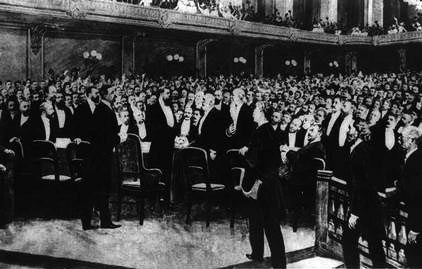At the sixth Zionist Congress in Basel, Switzerland, a year before his death, Theodor Herzl offered a suggestion that will live in infamy in the world of Zionism – The Uganda Scheme. Herzl came to the Congress with an offer from then British Colonial Secretary Joseph Chamberlain. Chamberlain was willing to fulfill Herzl and the Zionists’ request of securing land for a Jewish state. Unable to give the Zionists Palestine – at the time it was still in the hands of the Ottoman Empire – Chamberlain offered Herzl 5,000 miles of African territory then known as Uganda and is in today’s Kenya.
The delegates at the conference were split, with some seeing the benefits of the offer, and others vehemently opposing establishing a Jewish State outside of Eretz Yisrael, the land of Israel. When the Congress ultimately rejected the offer, the British withdrew it. Uganda wasn’t the only alternative to Eretz Yisrael considered by Herzl and other Zionists. The list of alternative lands is long, and in Herzl’s book, Der Judenstaat (the Jewish State) he even considered Argentina. 120 years after the Uganda Scheme was proposed, with an established Jewish State in the land of Israel, it’s difficult to understand how any land other than Eretz Yisrael was even considered. What motivated Herzl and his colleagues to consider a land other than Eretz Yisrael for the Jewish State?
Zion is one of many Hebrew names of Jerusalem; Herzl’s Zionism was named after the Jewish people’s eternal Capital. Did the leaders of Zionism not consider Eretz Yisrael to be essential to their movement? Can there be a Zionism without Zion?
The questions surrounding Zionism without Eretz Yisrael center on the assumption that the land of Israel is essential to Herzl’s Zionist movement – which is a baseless assumption. Many assume Herzl’s main motivation in founding his Zionist movement was to return the Jewish people to their ancient homeland, the land of Israel. Although eventually Herzl centered his efforts on founding a Jewish State in Eretz Yisrael, his main motivation was solving the Jewish question. Known for the insidious direction the Germans took the Jewish question, the question of what the world should do with its Jews was asked by the Jews just as much – albeit differently. Recognizing the rising levels of antisemitism in Europe, the Jews knew they needed to find a place of refuge. After 2,000 years of placing their security in the hands of others – and being attacked instead of shielded – Herzl and his colleagues knew the only path to securing the Jewish people was their own state where they could protect themselves.
The location of the state was a secondary consideration to the priority of finding safety for the Jewish people.
Israel’s Declaration of Independence reflects the idea of the Jewish State being a place of refuge for Jews fleeing persecution. It stated, “The catastrophe which recently befell the Jewish people – the massacre of millions of Jews in Europe – was another clear demonstration of the urgency of solving the problem of its homelessness by re-establishing in Eretz-Israel the Jewish State.” Israel’s Declaration of Independence also listed Eretz Yisrael as the Jewish people’s rightful homeland, “The Land of Israel was the birthplace of the Jewish people. Here their spiritual, religious and political identity was shaped. Here they first attained to statehood, created cultural values of national and universal significance…Impelled by this historic and traditional attachment, Jews strove in every successive generation to re-establish themselves in their ancient homeland.”
The Jewish people’s connection to the land of Israel is undeniable – even though many continuously try to deny it. The Jewish people’s Patriarch, Abraham, passed this land down to his children, and they took up the charge when Joshua led them through the land more than three thousand years ago. There has been a continuous Jewish presence in the land, including more than fifteen hundred years of autonomous rule, ever since. Even Jews who were exiled from the land continued to look at Eretz Yisrael as their homeland. There is no such thing as the Jewish people without a connection to the land of Israel.
In the late 1800’s Theodore Herzl started a political movement he coined Zionism. This movement was built on an ideology that was more than four thousand years old. The ideology of Zionism stated that the Jewish people have a right to self-determination on their homeland, the land of Israel. This wasn’t Herzl’s notion; this was Judaism at its core. While the movement of Zionism briefly considered other lands in an effort to save Jewish lives, it remained loyal to the connection between the Jewish people and the land of Israel.
As a successful country in its historic homeland the clock can never be turned back and the question of the Jewish State in the land of Israel isn’t open for discussion. The Jews belong to Israel and Israel belongs to the Jews. These two institutions are inseparable and will never be divided. Zionism demands the land of Israel and no other place can come close.



